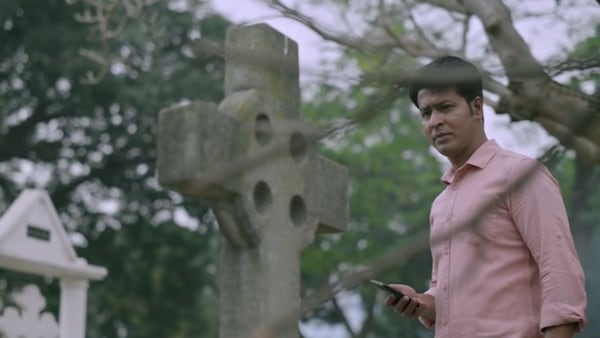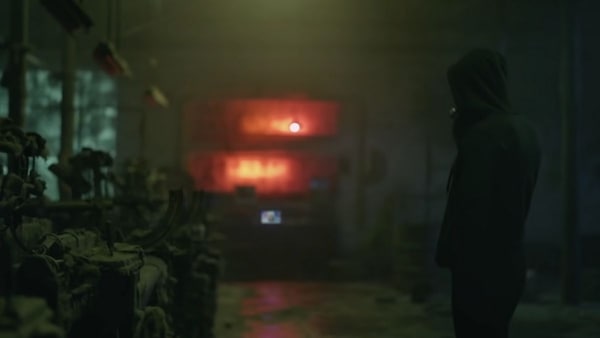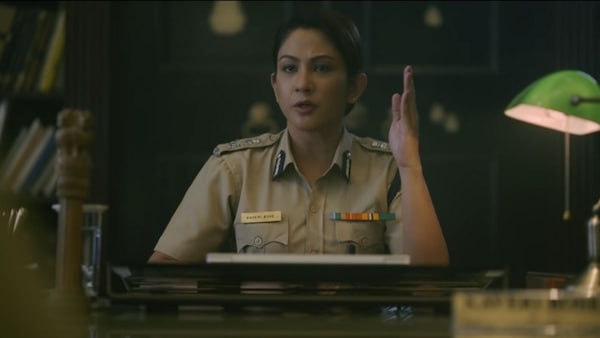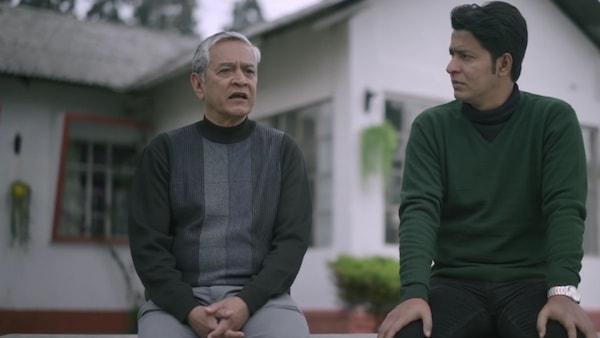Mukhosh movie review: Anirban Bhattacharya’s crime thriller is a genuine effort towards the ‘different’ despite being lacklustre
In a city grappling with midnight terrors, a criminologist finds himself smack amidst an ongoing murder spree that has unfortunately targeted the very organisation he has just joined - the Kolkata Police force. Will he be able to stop these heinous crimes, or will the murderer get away scot-free?

Last Updated: 03.01 PM, Sep 16, 2021
Story:
Criminologist Kingshuk Roy’s admission to the Kolkata Police coincides with the beginning of serial murders across Kolkata. As the police force tries to nab this psychopath, it comes under major threat. The whodunnit explores how a competent team of police officers manage to corner the serial killer and uncover the truth behind his actions.
Review:
A bustling city, the usual humdrum of daily life, a lone murderer, and an ancient mask. Birsa Dasgupta’s latest whodunnit Mukhosh (which translates to ‘mask’) is a perfectly satisfactory thriller that manages to keep audiences engaged. Kingshuk Roy (Anirban Bhattacharya), a criminologist by profession, joins the Kolkata Police to aid them with ongoing cases. His entry into the force coincides with the first of a series of killings where the murderer follows a peculiar pattern. It’s observed that he first kidnaps his victims, and then slowly attempts to extract their hearts, all the while watching them scream in pain and agony. Coupled with this gruesome detail, he litters the scene of the crime with repeating motifs – one of them being a bejewelled figurine of Jesus with specific psalms inscribed at the back.
The frequent killings follow yet another pattern – the targets are only police officers. The murderer is so desperate that he even nabs a victim while he is on vigil duty, meters away from the headquarters. Things get embarrassing for the force as media begins to question their efficiency and things are brought to the notice of higher-ups. Senior inspector Kaberi (Chandreyee Ghosh) is delegated to head a team that would uncover these murders at the earliest.
As Kingshuk, Kaberi and the team try to hunt the psychopath, the audiences are taken on a cat-and-mouse chase across town. Kingshuk, the moral centre of the film, is often accompanied in his analytical studies by his wife Rai (Payel Dev), who steers his thoughts in the appropriate direction.

Despite repeated attempts, the crew are unable to hoodwink the killer and are finally forced to step down from the case (with multiple police officers being killed). But the new appointees prove useless and as a result, Kaberi is reinstated to her lost throne. A diligent, no-nonsense woman, she vows that the second time’s got to be a charm. Bolstered with renewed vigour the team finally receives a lead that they decide to follow.
A heightened climax later, the team manages to nab the miscreant.
Mukhosh delves into the psyche of an antagonist, and what triggers a person to take the “wrong” path. Dasgupta calls to question the very basis of good vs evil and whether it’s even justified to categorise human actions into reductive sections. The thriller also emphasises the need to evaluate man’s actions with respect to his context, and that the two are always mutually exclusive.
The film delves into the workings of a criminal mind and tries to answer questions about the how’s behind their choices. Dasgupta instils in his characters an odd sense of belonging, in that they feel relatable and even vulnerable. The general overtness that’s often found in thrillers produced by the Bengali film industry, is thankfully absent in this one. Barring a few ham scenes, the overall narrative gives viewers a chance to enter the filmmaker’s universe and stay true to what he is trying to sell.

Bhattacharya and Tota Roy Chowdhury are arguably the best performers, with a close second being Ghosh’s astute officer role. But acting aside, what really elevates the film’s aesthetic is Subhankar Bhar’s camerawork. The snazzy cuts and fast-paced action sequences amp up the momentum of the film. The gritty underbelly of a city grappling with notorious activities is aptly captured by Bhar.
The other positive about Mukhosh is its need to continually justify when and how the story evolves. This process eliminates any chance of disinterest or lack of investment from the audience’s perspective. Credit to Dasgupta for taking the extra effort to ensure that.

However, Mukhosh fails as an end-product. It skirts the area of being good and immersive but stumbles when it comes to research. The motive behind the murders, though justified, feel half-baked and in need of more meat. The antagonist’s sudden reveal, followed by a backstory of his sufferings seems insufficient to paint a clear picture of his atrocities. Instead, a detailed viewpoint into his evolution after the trauma would make for a more interesting watch. The film promises much and delightfully delivers on some too. But the aspects that go unexplored feel too dire for it to be completely ignored.
For a feature that claims to be a psycho-thriller, it was essential that the murderer’s character be fleshed out to the hilt. But Roychowdhury’s addition to the cast could almost be considered an afterthought, owing to the botched-up treatment of his character’s backstory.
Verdict: Mukhosh is not all about the bad. It’s a sincere attempt at something good, and that in itself ought to be hailed. Dasgupta and co. try their best to present a gripping, edge-of-the-seat story with above-average acting and better camerawork.
WHERE
TO WATCH
Subscribe to our newsletter for top content, delivered fast.

